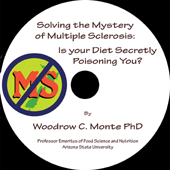Kiwis Warned to Avoid Poisonous Chewing Gum
Wellington resident Abby Cormack suffered severe physical and psychological side effects from excessive consumption of artificial sweetener through a four-packet-a-day chewing gum habit. (Photo courtesy of Abby Cormack)
A poisonous sweetener that mimics the symptoms of diabetes, multiple sclerosis, Alzheimer’s, and many other diseases could be poisoning thousands of Kiwis.
Betty Martini, founder of Mission Possible International, says aspartame is the root cause of untold suffering for millions of people worldwide.
Aspartame is also known as nutrasweet, equal and spoonful.
Dr Martini came to New Zealand after being contacted by a 25-year-old Wellington resident who had a severe reaction to aspartame-sweetened chewing gum.
Dr Martini has spent 15 years talking to people and organisations about the dangers of aspartame, highlighting studies from renowned medical researchers and organisations to substantiate her argument.
Suicidal Thoughts After Chewing Gum
Wellington resident Abby Cormack experienced horrific symptoms after consuming large quantities of diet chewing gum earlier this year.
She was chewing four packets of aspartame-sweetened chewing gum a day and in February she started to feel the effects.
“I became very, very depressed and anxious and I wasn’t sleeping well. I tried to ignore it but it became worse and worse.”
A psychiatrist diagnosed Miss Cormack with mild depression but found it difficult to fathom as she enjoyed a very stable and happy family, social and work life.
She then began to experience panic attacks and suicidal thoughts.
“I started getting physical symptoms. Muscle cramps that started off in my legs. I put the muscle cramps down to weight training.”
She stopped the weight training but the muscle cramps spread and grew worse. Her doctors suspected multiple sclerosis but the numerous tests showed that everything was normal.
Now suffering from exhaustion and excruciating pain, and wondering whether it was all in her head, Miss Cormack said the last straw was when she lost control of her bladder at work.
At that point her mother suggested looking in to her heavy use of sugar-free chewing gum. After checking the ingredients, she ‘googled’ phenylalanine, and up came aspartame.
“And I clicked on that and my symptoms came up – every one of them.”
This included her blurred vision, which had prompted visits to an optometrist.
American researcher and endocrinologist, Dr H. J. Roberts, identified blindness as being ‘the most serious complication’ from the use of aspartame. Miss Cormack said her symptoms disappeared within days of stopping her sugar-free gum habit.
In a letter to the New Zealand Food Safety Authority, Dr Martini said that aspartame is “an addictive excitoneurotoxic carcinogenic drug that will sicken and kill thousands of New Zealanders. The facts are of public record, you are informed of them, but prefer to poison your countrymen.”
Aspartame was discovered by a researcher from the U.S. company, G.D. Searle. Initially approved for use in food in 1974, it was put on hold until 1981, following objections raised over its safety. In 1985, Monsanto purchased G. D. Searle.
Aspartame is made up of aspartic acid (an excitotoxin) which, in excess, stimulates nerve cells to death and forms holes in the brain; phenylalanine, which when found in excess in the brain can lead to emotional disorders such as depression; and methanol which converts to formaldehyde, a deadly neurotoxin.
Research has linked aspartame to depletion of seratonin, which can lead to manic depression, panic attacks, violence and rage.
Gulf War Syndrome
Thousands of pallets of diet drinks were shipped to Desert Storm Troops during the Gulf War. They sat in the heat which would have metabolised the drinks into toxic potions, says an American doctor.
The symptoms of the Gulf War Syndrome are identical to those of Aspartame poisoning.
Aspartame and Diabetics
Diabetes New Zealand advises people to avoid excessive intakes of artificial sweeteners but said, “There is no evidence that a low to moderate intake by adults causes harm.”
People are advised to “vary the type used to avoid excessive consumption of any individual product which enables a greater margin of safety to be achieved.”
The New Zealand Food Safety Authority feels that media reports have raised unnecessary alarm over the safety of aspartame.
“Aspartame is probably one of the most studied products on sale today,” Deputy Chief Executive Sandra Daly says, “and there is an extensive body of evidence that tells us it is a safe product that offers consumers a sweet low-calorie option in their diet.”
The American Food & Drug Agency once kept a public record of the side effects of aspartame – which totalled 10,000 by 1995 when it was halted. It included blindness, sexual dysfunction and death.
Betty Martini will speak in Wellington and Auckland late July/early August.
Tuesday 31 July 6:00pm Mezzanine Floor, Central Library, Wellington.
Thursday 2 August 7:30pm Henley Lecture Theatre, Level 4, Bldg 501, Auckland Medical School, 85 Park Rd Grafton, Auckland.
Betty Martini has been researching aspartame for 15 years and works with the world experts. Dr Roberts’ medical text is dedicated to her. Prior to that she had 22 years of experience in the medical field, creating the first health delivery system in the US, and had 200 doctors working for her.
She has been given an honorary doctorate for her humanitarian work of alerting the world about aspartame, and comes as the messenger of the world experts she works with. She is also on the advisory board of the World Natural Health Organisation.
By Diane Cordemans
Epoch Times Hamilton staff
Jul 23, 2007
http://en.epochtimes.com/tools/printer.asp?id=57897


